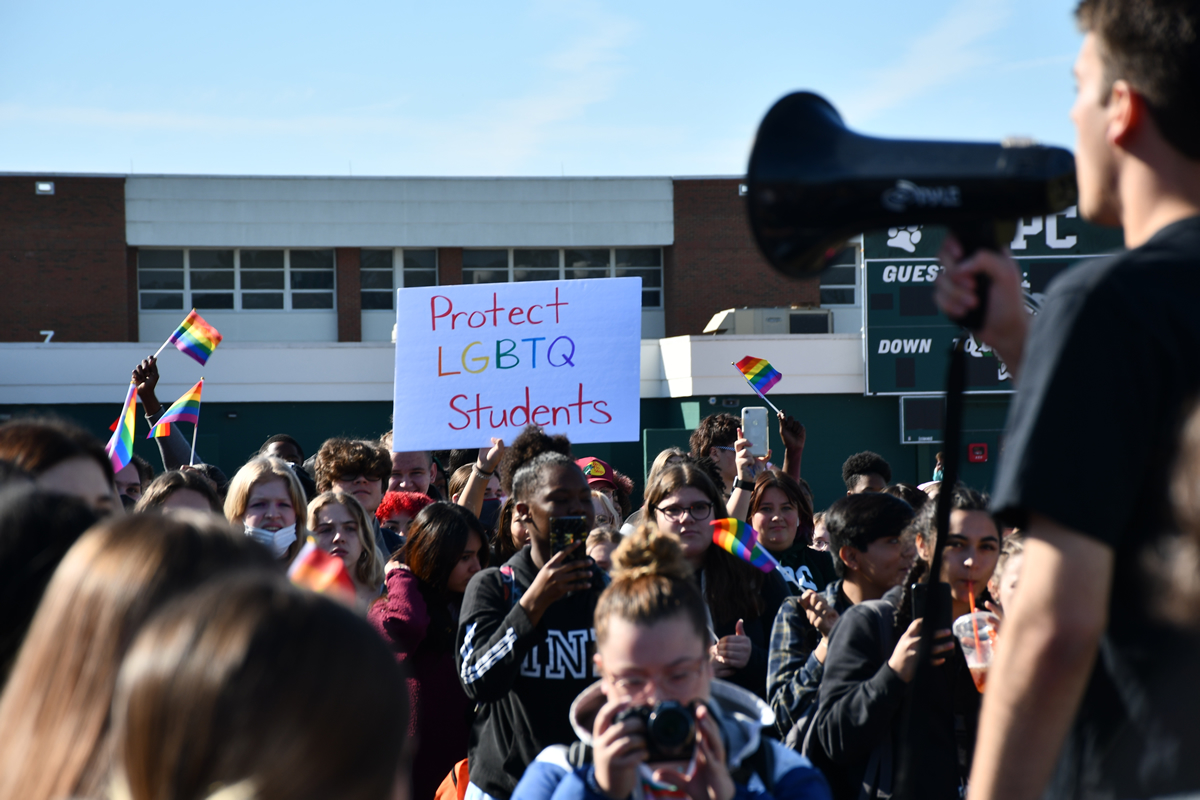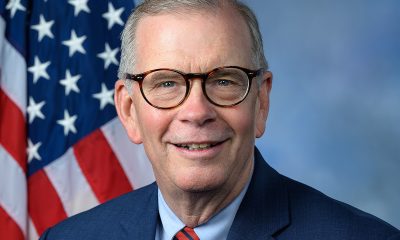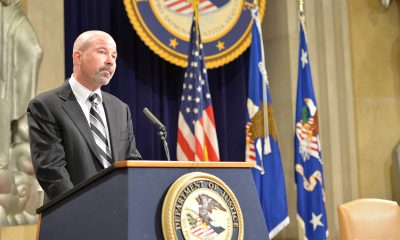National
Florida ‘Don’t Say Gay’ law goes into effect, impact already felt
LGBTQ youth, already at higher risk of depression, anxiety, & suicide than their peers, report their mental health being negatively impacted

Florida’s HB 1557, known as the Don’t Say LGBTQ law, took effect today. The law, which bans classroom instruction on sexual orientation and gender identity in grades K-3 and restricts that instruction in grades 4-12, will immediately begin impacting efforts to make Florida classrooms more inclusive.
But its impacts have already been felt for months. Educators and school staff have shared the chilling effects they are experiencing across the state. Books with LGBTQ characters are being pulled from shelves. Rainbow “safe space” stickers are being peeled from classroom windows. LGBTQ educators are being asked to avoid speaking about their families. As the law officially goes into effect, these impacts will escalate.
In the same district, teachers in queer relationships are being advised to remove any family portraits. Staff can’t even wear rainbow clothing.
— Jack Petocz (@Jack_Petocz) June 28, 2022
We always knew what this was about, silencing LGBTQ+ people.
“Since the inception of this hateful policy, lawmakers have assured the public that it would not lead to censorship or erasure of LGBTQ people,” said Joe Saunders, Equality Florida Senior Political Director. “But our community has always known the truth. The Don’t Say LGBTQ law has always been fueled by anti-LGBTQ animus and designed to further stigmatize the LGBTQ community, ban books about us, erase us from classrooms, and force us back into the closet. It is a bigoted and dangerous law that is making Florida less safe for students and families, and we will work tirelessly to see it repealed.”
Throughout the legislative process, lawmakers scoffed at the suggestion that HB 1557 would have negative impacts on the LGBTQ community, even as they refused to clarify its dangerously vague language and prevent the eventual law from doing harm.
A bipartisan contingent of lawmakers offered up dozens of amendments to the bill, attempting to narrow its overly-broad scope and clarify the most vague components. These amendments came after assertions from their colleagues that the bill’s intent was narrow. However, those reasonable amendments were rejected by bill sponsors Representative Joe Harding, Senator Dennis Baxley, and their allies, leaving its language broad and discriminatory.
As a result, the chilling effects were swift and sweeping. Across the state, censorship of LGBTQ lives began in earnest and has continued until today. In Palm Beach County, School Superintendent Mike Burke began by circumventing the district’s material review process to remove multiple books featuring LGBTQ characters, citing concern about the implications of the Don’t Say LGBTQ law. He followed the move in recent weeks by issuing guidance to educators across the district for them to remove books currently being challenged and place them “in a classroom closet” and scour their shelves for other titles that may include LGBTQ characters or mention topics like racism or oppression.
Growing up, I spent countless nights trying to change who I am. Praying to God I could wake up different, what I had preconceived as “normal.”
— Jack Petocz (@Jack_Petocz) July 1, 2022
Today, “Don’t Say Gay” goes into effect, but I’ll keep proudly expressing my identity, so no child feels lesser than or not worthy. ❤️ pic.twitter.com/3LzAIAjg1i
Districts statewide have taken drastic steps in response to the Don’t Say Gay law. Graduation speeches have been scrubbed of references to LGBTQ advocacy. Yearbook pages have had images of Don’t Say LGBTQ walkouts blacked out. Conservative religious activists have successfully initiated challenges to dozens of books in multiple school districts. Rainbow-colored COEXIST banners and Pride flags have been stripped from school walls.
In total, LGBTQ+ equality rights advocacy group Equality Florida has received over 50 complaints of censorship aimed at the LGBTQ community since the bill was signed into law in March.
I wrote an OP ED for @nytopinion about my experience growing up gay and non-binary and how the #DontSayGay bill would effect people like me. https://t.co/UPjmtExjnu
— Will Larkins☮️ (@ProudTwinkie) March 12, 2022
Most recently, Orange County Public Schools garnered national attention after reports emerged that during seminars designed to discuss the potential implementation of the Don’t Say LGBTQ law, school administrators were advised to begin removing rainbow “safe space” stickers from classroom windows, ask LGBTQ educators to remove family photos from their desks, and avoid talking about their loved ones at work for fear of running afoul of the new law. While exactly what advocates for equality had warned of, the revelation shocked educators across the district, who took to the next board meeting to express their deep concerns and demand written clarification.
All of these chilling effects come as LGBTQ youth, those already at higher risk of depression, anxiety, and suicidal ideation than their peers, report their mental health being negatively impacted by anti-LGBTQ policies and the debates that surround them. And they come amidst a surge in online harassment against LGBTQ people nationwide and threats of violence against LGBTQ spaces and Pride celebrations fueled by the dehumanizing anti-LGBTQ+ rhetoric launched by the DeSantis Administration in defense of the Don’t Say LGBTQ bill.
In March, the governor’s spokeswoman Christina Pushaw took to Twitter to traffic in age-old, anti-LGBTQ tropes to rescue the mired legislation, tropes that have since been parroted by Fox News hosts, right-wing influencers, and have exploded into the digital harassment and threats of violence running rampant across the country.
Equality Florida hosted a virtual press conference with lawmakers and those directly impacted on Friday morning. Those who have been impacted by the Don’t Say LGBTQ law can share their stories at freetosaygay.org.
White House Press Secretary Karine Jean-Pierre released a statement as Florida’s “Don’t Say Gay” Law took effect Friday:
Today, some of Florida’s most vulnerable students and families are more fearful and less free. As the state’s shameful “Don’t Say Gay” law takes effect, state officials who claim to champion liberty are limiting the freedom of their fellow Americans simply to be themselves. Already, there have been reports that “Safe Space” stickers are being taken down from classrooms. Teachers are being instructed not to wear rainbow clothing. LGBTQI+ teachers are being told to take down family photos of their husbands and wives—cherished family photos like the ones on my own desk.
This is not an issue of “parents’ rights.” This is discrimination, plain and simple. It’s part of a disturbing and dangerous nationwide trend of right-wing politicians cynically targeting LGBTQI+ students, educators, and individuals to score political points. It encourages bullying and threatens students’ mental health, physical safety, and well-being. It censors dedicated teachers and educators who want to do the right thing and support their students. And it must stop.
President Biden has been very clear that every student deserves to feel safe and welcome in the classroom. The Department of Education will be monitoring this law, and any student or parent who believes they are experiencing discrimination is encouraged to file a complaint with the Department’s Office for Civil Rights. Our Administration will continue to fight for dignity and opportunity for every student and family—in Florida and around the country.
National
National resources for trans and gender diverse communities
Amid attacks, help is available from wide range of organizations

The Trump administration has launched a series of executive orders and other initiatives restricting the rights of the transgender community since taking power in January, targeting military service, affirming healthcare, and participation in sports.
Though many executive orders are being challenged in court, it’s an uncertain time for a community that feels threatened. Despite the uncertainty, there are resources out there to help.
From legal assistance to mental health support, here’s a list of nonprofits and organizations dedicated to improving the everyday livelihood of trans and gender diverse people. These are mostly national organizations; there are many additional groups that work in local communities across the country. Some of these national groups will connect those in need of help to a local organization.
LEGAL HELP
President Trump issued an executive order declaring there are only two genders –– male and female –– which applies to legal documents and passports. The order doesn’t recognize the idea that one can transition their gender at birth to another gender.
Ash Lazarus Orr filed to renew his passport with a gender marker reflecting his identity. That was in January, and he still hasn’t received it. He refused to accept a passport without an accurate identification of who he is, so he filed a lawsuit with the ACLU in what is now known as Orr v. Trump.
Orr told the Washington Blade that not receiving his passport back has taken away his freedom of visiting family in Canada and receiving gender-affirming care from a trusted provider in Ireland.
The one thing getting him through this uncertain time is knowing who he’s fighting for –– the trans community, his loved ones, and himself.
“I’m trying to be that person that those younger parts of me needed growing up,” Orr said. Check out a couple of legal support organizations below:
Transgender Law Center
The Transgender Law Center (TLC) provides legal resources and assistance. TLC has a list –– called the Attorney Solidarity Network –– of attorneys that can provide advice or representation for trans people.
The organization also has a legal information help desk that answers questions regarding laws or policies impacting trans people.
Website: transgenderlawcenter.org
Phone: 510-587-9696
Email: [email protected]
Advocates For Trans Equality
With a variety of different programs tailored toward legal assistance and advocacy work, Advocates For Trans Equality’s reach is wide.
The non-profit offers the Name Change Project, which provides pro bono legal name change services to low-income trans, gender-non-conforming and nonbinary people by utilizing its partnerships with law firms and corporate law departments.
Advocates For Trans Equality also has departments and programs dedicated to increasing voter engagement, educating lawmakers on trans issues and offering litigation assistance to a small number of cases.
Website: transequality.org
Phone: 202-642-4542
General email: [email protected]
To contact a specific department or program, visit its website above.
ADVOCACY
Looking to take action and get involved? Act now.
American Civil Liberties Union
The ACLU is a national nonprofit organization that mobilizes local communities and advocates for national causes.
Getting involved is as easy as filling out letters to representatives or signing petitions. One live petition is to “defend trans freedom.”
You can also join its People Power platform, where you serve as a volunteer in your community to “advance civil liberties and civil rights for all.” ACLU has different chapters across the country, so visit its website for more information.
Website: aclu.org
Phone: 212-549-2500
MILITARY AND VETERANS
Trump signed an executive order in January banning transgender service members from serving, stating their identity “conflicts with a soldier’s commitment to an honorable, truthful and disciplined lifestyle, even in one’s personal life.”
Though the order has been legally challenged and struck down by a judge, U.S. Navy Lieutenant Rae Timberlake said it’s created an uncertain atmosphere for themself and other troops.
“All of the transgender service members I know have served with honor and integrity for many years…[and we’re] targeted for removal and not subject to any kind of review based on merit,” Timberlake, who joined the Navy at age 17, said. “There’s kind of just this cloud looming over our organizations and our units, because we know any day our transgender shipmates could no longer be on the team.”
But Timberlake’s message to any service member struggling because of the executive order was one of compassion and truth: “There’s no policy that can take away what you’ve accomplished and what you’ve done.”
Here are some organizations that support service members and veterans:
SPARTA Pride
SPARTA is a peer-support group composed of active duty, veteran and “future warrior” service members.
The group also engages in advocacy work and has helped change policies on gender neutral uniforms and reducing the time a trans service member would have to wait to return to their duties during their transition.
Contact SPARTA to learn more about joining its support network.
Website: spartapride.org
Email: [email protected]
Modern Military Association
Modern Military supports service members and veterans through advocacy, legal assistance and mental health support.
It tracks LGBTQ+ and HIV discrimination through reports made on its website, and offers guidance and advice to whoever submitted the report.
It also supports the mental health of LGBTQ+ veterans and their families through its Resilient Heroes Program. By signing up, you’ll receive virtual peer support and case management services with a mental health coordinator.
Website: modernmilitary.org
Phone: 202-328-3244
Email: [email protected]
CRISIS & MENTAL HEALTH SUPPORT
If you have a more urgent matter, or just need someone to listen, here are some organizations you can reach out to:
The Trevor Project
The Trevor Project offers 24/7 counseling services. Calling, texting or chatting is free and confidential, and you’ll get to speak with someone specialized in supporting LGBTQ youth.
The organization also focuses on public education by hosting online LGBTQ suicide prevention trainings. It advocates for policies and laws that contribute to supporting queer youth.
Website: thetrevorproject.org
Crisis hotline: 1-866-488-7386
General inquiry phone number: 212-695-8650
Trans Lifeline
Trans Lifeline is a hotline run and operated by trans people. Whether you’re questioning if you’re trans or are a trans person just wanting to talk, someone will be there to help. It’s free and confidential, and there won’t be any non-consensual active rescue, such as calling the emergency services.
The line is not 24/7, however. Check out its website for hours within your time zone.
Website: translifeline.org
Phone: 877-565-8860
Here are other organizations that offer support to the trans community:
TransFamilies (support): Support for families with a gender diverse child.
TransLatina Coalition (advocacy): Advocates for the specific needs of the transgender, gender expansive and intersex communities in the U.S.
TransAthlete (information): Provides informative resources about trans athletes.
Campaign for Southern Equality’s Trans Youth Emergency Project (healthcare support): A fund to help trans youth access lifesaving healthcare.
TransTech Social (economic empowerment): Dedicated to discovering and empowering the career-ready skills of LGBTQ+ people.
World Professional Association For Transgender Health (health): Resources, symposiums and research dedicated to improving transgender health.
Sylvia Rivera Law Project (legal): Legal programs and services for marginalized communities.
Gender Spectrum (support): Resources and support groups for trans youth and families.
The Okra Project (support): Creates and supports initiatives that provide resources for the Black Trans community.
The White House
White House does not ‘respond’ to reporters’ requests with pronouns included
Government workers were ordered not to self-identify their gender in emails

White House Press Secretary Karoline Leavitt and a senior advisor in the Department of Government Efficiency rejected requests from reporters who included their pronouns in the signature box of their emails, each telling different reporters at the New York Times that “as a matter of policy,” the Trump-Vance administration will decline to engage with members of the press on these grounds.
News of the correspondence between the journalists and the two senior officials was reported Tuesday by the Times, which also specified that when reached for comment, the White House declined to “directly say if their responses to the journalists represented a new formal policy of the White House press office, or when the practice had started.”
“Any reporter who chooses to put their preferred pronouns in their bio clearly does not care about biological reality or truth and therefore cannot be trusted to write an honest story,” Leavitt told the Times.
Department of Government Efficiency Senior Advisor Katie Miller responded, “I don’t respond to people who use pronouns in their signatures as it shows they ignore scientific realities and therefore ignore facts.”
Steven Cheung, the White House communications director, wrote in an email to the paper: “If The New York Times spent the same amount of time actually reporting the truth as they do being obsessed with pronouns, maybe they would be a half-decent publication.”
A reporter from Crooked media who got an email similar to those received by the Times reporters said, “I find it baffling that they care more about pronouns than giving journalists accurate information, but here we are.”
The practice of adding pronouns to asocial media bios or the signature box of outgoing emails has been a major sticking point for President Donald Trump’s second administration since Inauguration Day.
On day one, the White House issued an executive order stipulating that the federal government recognizes gender as a binary that is immutably linked to one’s birth sex, a definition excludes the existence of intersex and transgender individuals, notwithstanding the biological realities that natal sex characteristics do not always cleave neatly into male or female, nor do they always align with one’s gender identity .
On these grounds, the president issued another order that included a directive to the entire federal government workforce through the Office of Personnel Management: No pronouns in their emails.
As it became more commonplace in recent years to see emails with “she/her” or “he/him” next to the sender’s name, title, and organization, conservatives politicians and media figures often decried the trend as an effort to shoehorn woke ideas about gender (ideas they believe to be unscientific), or a workplace accommodation made only for the benefit of transgender people, or virtue-signaling on behalf of the LGBTQ left.
There are, however, any number of alternative explanations for why the practice caught on. For example, a cisgender woman may have a gender neutral name like Jordan and want to include “she/her” to avoid confusion.
A spokesman for the Times said: “Evading tough questions certainly runs counter to transparent engagement with free and independent press reporting. But refusing to answer a straightforward request to explain the administration’s policies because of the formatting of an email signature is both a concerning and baffling choice, especially from the highest press office in the U.S. government.”
U.S. Military/Pentagon
Air Force rescinds rule barring inclusion of preferred pronouns in email signatures
Conflict with language in military funding package may explain reversal

The U.S. Air Force has issued a “directive to cease the use of ‘preferred pronouns’ (he/him, she/her, or they/them) to identify one’s gender identity in professional communications,” according to a report published in the Hill on Wednesday.
The rule, which applies to both airmen and civilian employees, was first adopted on Feb. 4 pursuant to President Donald Trump’s anti-transgender executive order called, “Defending Women from Gender Ideology Extremism and Restoring Biological Truth to the Federal Government.”
Days after the administration’s issuance of that order on the first day of the president’s second term, the Office of Personnel Management instructed agencies across the whole of the federal government to remove pronouns from email signatures and enforce the policy barring employees from using them.
Additionally, on Jan. 27 Trump published an order barring trans people from joining the U.S. Armed Forces, indicating that those who are currently in serving would be separated from the military. The Pentagon is fending off legal challenges to the ban in federal courts.
Particularly given the extent of the new administration’s efforts to restrict the rights of trans Americans and push them out of public life, the Air Force’s reversal of the pronoun guidance was surprising.
According to reporting in Military.com, the move might have come because officials concluded the rule was in conflict with language in the military appropriations funding legislation passed by Congress in 2023.
The NDAA established that the defense secretary “may not require or prohibit a member of the armed forces or a civilian employee of the Department of Defense to identify the gender or personal pronouns of such member or employee in any official correspondence of the Department.”
-

 Opinions4 days ago
Opinions4 days agoIt’s time for new leadership on the Maryland LGBTQIA+ Commission
-

 The White House4 days ago
The White House4 days agoWhite House does not ‘respond’ to reporters’ requests with pronouns included
-

 Noticias en Español5 days ago
Noticias en Español5 days agoINDIGNACIÓN: ¡El transfeminicidio de Sara Millerey en Colombia nos cuestiona como sociedad!
-

 Congress5 days ago
Congress5 days agoHouse Republicans advance two anti-trans education bills












